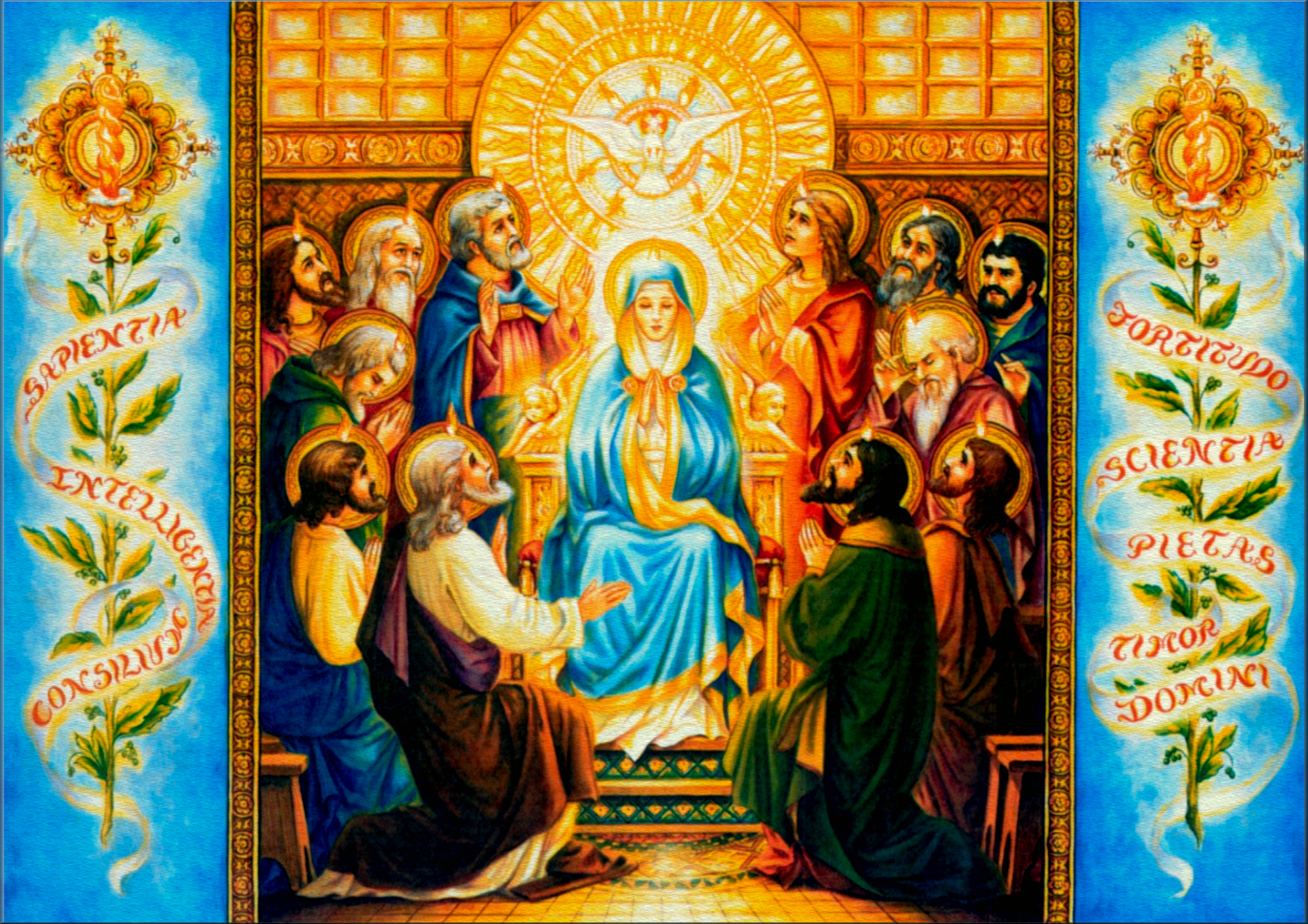
 8. Devotion to the Holy Spirit The Golden Key to Graces DEVOTION to the Holy Spirit is the golden key wherewith the soul gains free access to His infinitely rich treasure chamber. From this treasury, the Holy Spirit dispenses graces upon graces with boundless liberality and delight, for He is Eternal Love, and to give affords Him more pleasure than man experiences in receiving. In His infinite love He ardently desires to make souls happy, more so than a mother desires to gladden her child. Souls who honor the Holy Spirit in a particular manner are assured of receiving special graces. The holy Mother of God and the Apostles were the first to practice special devotion to the Holy Spirit. St. Paul speaks of the Holy Spirit more than a hundred times in his Epistles. All the holy Fathers of the Church have followed in the footsteps of the Apostles. All have glorified the Holy Spirit, and some have written whole volumes in His praise. To St. Ambrose alone are ascribed four books on the Holy Spirit. Once when the glorious Pontiff, Pope St. Pius V, was considering these words of the Royal Psalmist: "Send forth Thy Spirit and they shall be created, and Thou shalt renew the face of the earth," he felt convinced that these words, which were fulfilled on the first Pentecost, would continue to be realized if Christians would invoke the Holy Spirit with contrite hearts. Pope Leo XIII, in his encyclical of May 9, 1897, writes: "We earnestly desire that ... piety may increase and be inflamed toward the Holy Spirit, to whom especially all of us owe the grace of following the path of truth and virtue." "Devotion to the Holy Spirit," says Cardinal Manning, "seeks to awaken in us a consciousness of the presence and indwelling of the Holy Spirit, not only in the Church as a whole, but in each one of us." The Holy Spirit is not honored at all by some Catholics, and far too little by most. It is regrettable that so few prayer books contain devotions to the Holy Spirit, for it is by the incessant administration of graces that He operates the supernatural life of the faithful. Let it be remembered that all the light, inspirations, Divine calls; all the good acts which we have performed during our life; all our acts of contrition, of confidence in the Divine mercy, of love, of resignation, have been gifts of the Holy Spirit. The hidden manner in which the Holy Spirit operates obscures His graces from our superficial sight, but let us never forget that we are His temples. St. Vincent Pallotti While a young student, St. Vincent Pallotti, who died in Rome in 1850, had little aptitude for study and made little progress in school. Upon his mother's advice, he asked the Holy Spirit for one ray of light to illuminate his weak understanding. Behold, the Holy Spirit sent the ray of light into the heart of the pious student, and Pallotti became not only a useful priest, but an eminent preacher and the founder of a religious Congregation. How to Prepare for the Coming of the Holy Spirit To obtain the Gifts of the Holy Spirit, we should first of all excite in our hearts an ardent desire for the Holy Spirit and His Gifts by considering the great graces which He dispenses, especially His burning charity and heavenly consolations. Our Divine Saviour repeatedly promised the Apostles the Holy Spirit as a Comforter, Counselor and Teacher. Secondly, we should, according to the example of the Apostles before Pentecost, pray most fervently for the Holy Spirit. Prayer is the golden key to the treasure chamber of the Holy Spirit. Therefore, we should make novenas to the Holy Spirit often during the year. Novena to the Holy Spirit St. John Vianney, the Cure of Ars, was accustomed to say: "Without the Holy Spirit, all is cold. Therefore, when we feel we are losing our fervor, we must instantly start a novena to the Holy Spirit to ask for faith and love." The nine days following the Ascension of Our Lord were spent by the Blessed Virgin and the Apostles in preparing themselves by prayer and recollection for the coming of the Holy Spirit. This was the first novena ever made in the Catholic Church. Having been made at the command of Our Lord Himself, it is the model of all other novenas and should hold a prominent place in our devotions. St. Alphonsus writes: "The novena to the Holy Spirit is the chief of all novenas, because it was the first that was ever celebrated, and ----------- by the holy Mother of God with the Apostles in the Supper-room. It was rewarded by many wonders and Gifts, principally by the descent of the Holy Spirit, a Gift merited for us by the Passion of Jesus Christ Himself." Pope Leo XIII prescribed that a novena be made before the Feast of Pentecost in all parish churches to implore the return of heretics and schismatics to the True Faith. "Our hearts are the altars of God," says St. Gregory, "where He desires that the fires of Divine love should be always burning. Therefore the Eternal Father, not satisfied with having given us His Son Jesus Christ to save us by His death, would also give us the Holy Spirit, that He might dwell in our souls and keep them constantly on fire with His Divine love." Any of the prayers in this presentation [next page] may be used for a novena. Also, the Glory be to the Father, said seven times in honor of the Holy Spirit, is recommended. For the Feast of Pentecost St. Gregory the Great writes: "As God has given to the body of man two important parts, the head and the heart, that they may be the organs of the principal faculties, the understanding and the will, so the same God has given to the Mystical Body, which is the Catholic Church, Christ as its Head and the Holy Spirit as its Heart. Through the one we learn the eternal truth; through the other we learn to love and practice it." The Holy Spirit descended from the heights of Heaven to distribute the immense treasures which our Saviour merited through His bitter Passion and Death. He crowns the work of Redemption and illuminates the world by the beams of truth and love. The Holy Spirit came down in the form of a dove, of flames, and of fiery tongues. He came in the form of a dove because by His gentleness and mildness He desires to give us tranquility of heart; in the form of flames to symbolize the zeal for justice which He imparts; and as fiery tongues to enkindle men that they may speak words of burning love. On the Feast of Pentecost, the Holy Spirit came and consecrated the Apostles as spiritual temples and sanctified them so that everything displeasing to God was consumed. We, too, have been consecrated by the Holy Spirit as temples of the Most High in the laver [baptismal water] of spiritual regeneration. In holy Baptism we have been purified from Original Sin, and by receiving Sanctifying Grace we have been adorned with the robe of honor and justification. From being sinners we became just, and from being enemies of God, we were made His friends, His children, and heirs of heavenly glory. Oh, how sincerely grateful we should be to our Sanctifier, the Giver of Sanctifying Grace, the Holy Spirit! How thankfully we should recall the day of our Baptism! The early Christians so highly esteemed the anniversary of their Baptism that they celebrated it as a festival, and each year renewed their baptismal vows to show their gratitude to the Most Blessed Trinity and especially to the Holy Spirit. On the anniversary of our Baptism, we, too, should renew our baptismal vows and be thankful for the priceless benefits bestowed on us in this great and sublime Sacrament through which we were delivered from the slavery of Satan, washed from our sins, given new spiritual life, adorned with the robe of light and grace, admitted to the fold of Christ, and through which we received the indelible imprint of the seal of sanctity [the baptismal "character"] upon our souls through the operation of the Holy Spirit. Let us never forget that we are members of that Mystical Body of which Christ is the Head and the Holy Spirit the Soul. St. John Chrysostom overcame all the assaults of the evil spirit by renewing his baptismal vows in these words: "I renounce thee, Satan. I despise thee and all thy works! I will have no share with thee and in thy pride. Thou, O Jesus, art my Lord and Master, Thou art my Saviour! To Thee I cling; I surrender myself entirely to Thee." The Saint frequently recommended this exercise in his sermons.  E-MAIL E-MAIL HOME----------------TRADITION-------------------VENI CREATOR www.catholictradition.org/Tradition/holy-ghost8.htm |